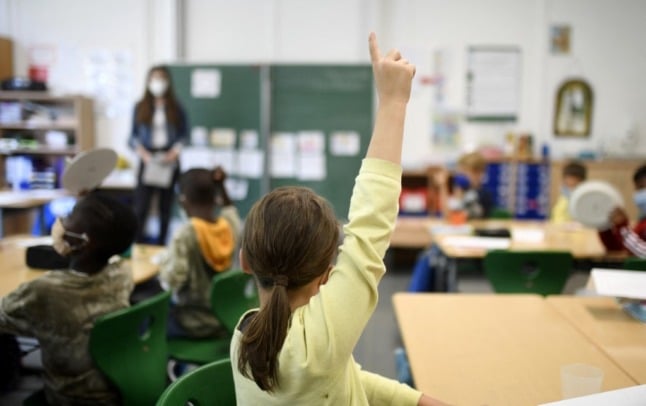'Alarming': How children in Germany are lagging behind on reading skills

According to a new international study published on Tuesday, one in four children in the fourth year of school in Germany cannot read properly - placing the Bundesrepublik behind many other countries.
According to the Progress in International Reading Literacy Study (Igloo) presented in Berlin on Tuesday, 25 percent of children in this school year have not reached the minimum level of reading comprehension considered necessary to advance to the next school year.
Children enter the fourth year of school in Germany at around 10 years old.
In the last Igloo survey, published at the end of 2017, the figure stood at 19 percent.
According to the study authors, the proportion of affected pupils with major reading difficulties is now "alarmingly high".
The affected group will have "considerable difficulties in almost all school subjects" in their further school career if they cannot catch up, they stated.
How Germany compares to other countries
Primary school pupils in Germany perform worse in reading literacy than their peers in many other countries.
However, the Bundesrepublik also scored far better than several survey-takers, or 19th place out of the participating 65 countries and regions - encompassing a total of 400,000 pupils.
Germany-wide around 4,600 pupils from 252 fourth grade classes took part in the survey. They each received factual and narrative texts - and corresponding comprehension tasks - which they had to solve on laptops.
Singapore came out on top with 587 points, with South Africa at the bottom with 288 points. With 524 points, Germany's fourth graders are roughly in line with the EU and OECD average. The median score across the EU was 527, slightly higher than Germany.
READ ALSO: 'Room for improvement': How Germany's schools compare to the rest of Europe
Countries like Spain, France or Belgium scored worse. In contrast, reading performance in England (with a score of 558) and Poland (at 549) ranked higher.
After an initial improvement in the mid-2000s - also with the international PISA comparison - Germany's score has now fallen to a low for the third time in a row.
Countries such as Russia or Slovenia have been able to improve significantly over the past two decades, according to the study - as opposed to Germany and some of its neighbours.
"In Germany, the Netherlands and Sweden, on the other hand, a problematic development is evident," the report stated.

A pupil raises her hand during a summer project at the primary school 'Sonnenschule' in Beckum, western Germany, on July 6, 2021. (Photo by Ina FASSBENDER / AFP)
Why did Germany score lower than in 2017?
The study authors concluded that "practically nothing has changed" with regard to educational justice and equal opportunities in Germany over the last 20 years, and that - if anything - there is growing inequality and access to resources in the country's schools.
The researchers also stated that that the percentage drop since 2017 is likely connected to school closures during the coronavirus pandemic, in which school operations were “severely restricted.”
Federal Education Minister Bettina Stark-Watzinger (FDP) described the results of the IGLU reading study as "alarming".
Being able to read well is one of the most important basic skills and the foundation for educational success, the FDP politician said in a statement on Tuesday.
"The IGLU study shows that we urgently need a turnaround in education policy."
She referred to the "Chance Start" programme planned by Germany’s coalition government, with which 4,000 schools "with a high proportion of socially disadvantaged pupils" are to receive special support.
The federal government wants to pour one billion euros annually into the programme, said Education State Secretary Sabine Döring said
Berlin's Senator for Education Katharina Günther-Wünsch (CDU), called the IGLU results "sobering".
The pandemic and an increasingly heterogeneous student body pose ever greater challenges for teachers, she said. "We are aware of this, and we will face these challenges."
READ ALSO: How German headteachers want to overhaul 'outdated' school system
Drop in basic skillsf
The sobering findings of Igloo join the results of other educational studies. Only last year, the IQB Education Trend, another regular series of tests among fourth graders, showed that they had fallen behind significantly in the basic skills in maths and German in recent years.
The Igloo Tests have been conducted every five years since 2001 through the Institute for School Development Research at the Technical University of Dortmand.
Comments
See Also
According to the Progress in International Reading Literacy Study (Igloo) presented in Berlin on Tuesday, 25 percent of children in this school year have not reached the minimum level of reading comprehension considered necessary to advance to the next school year.
Children enter the fourth year of school in Germany at around 10 years old.
In the last Igloo survey, published at the end of 2017, the figure stood at 19 percent.
According to the study authors, the proportion of affected pupils with major reading difficulties is now "alarmingly high".
The affected group will have "considerable difficulties in almost all school subjects" in their further school career if they cannot catch up, they stated.
How Germany compares to other countries
Primary school pupils in Germany perform worse in reading literacy than their peers in many other countries.
However, the Bundesrepublik also scored far better than several survey-takers, or 19th place out of the participating 65 countries and regions - encompassing a total of 400,000 pupils.
Germany-wide around 4,600 pupils from 252 fourth grade classes took part in the survey. They each received factual and narrative texts - and corresponding comprehension tasks - which they had to solve on laptops.
Singapore came out on top with 587 points, with South Africa at the bottom with 288 points. With 524 points, Germany's fourth graders are roughly in line with the EU and OECD average. The median score across the EU was 527, slightly higher than Germany.
READ ALSO: 'Room for improvement': How Germany's schools compare to the rest of Europe
Countries like Spain, France or Belgium scored worse. In contrast, reading performance in England (with a score of 558) and Poland (at 549) ranked higher.
After an initial improvement in the mid-2000s - also with the international PISA comparison - Germany's score has now fallen to a low for the third time in a row.
Countries such as Russia or Slovenia have been able to improve significantly over the past two decades, according to the study - as opposed to Germany and some of its neighbours.
"In Germany, the Netherlands and Sweden, on the other hand, a problematic development is evident," the report stated.

Why did Germany score lower than in 2017?
The study authors concluded that "practically nothing has changed" with regard to educational justice and equal opportunities in Germany over the last 20 years, and that - if anything - there is growing inequality and access to resources in the country's schools.
The researchers also stated that that the percentage drop since 2017 is likely connected to school closures during the coronavirus pandemic, in which school operations were “severely restricted.”
Federal Education Minister Bettina Stark-Watzinger (FDP) described the results of the IGLU reading study as "alarming".
Being able to read well is one of the most important basic skills and the foundation for educational success, the FDP politician said in a statement on Tuesday.
"The IGLU study shows that we urgently need a turnaround in education policy."
She referred to the "Chance Start" programme planned by Germany’s coalition government, with which 4,000 schools "with a high proportion of socially disadvantaged pupils" are to receive special support.
The federal government wants to pour one billion euros annually into the programme, said Education State Secretary Sabine Döring said
Berlin's Senator for Education Katharina Günther-Wünsch (CDU), called the IGLU results "sobering".
The pandemic and an increasingly heterogeneous student body pose ever greater challenges for teachers, she said. "We are aware of this, and we will face these challenges."
READ ALSO: How German headteachers want to overhaul 'outdated' school system
Drop in basic skillsf
The sobering findings of Igloo join the results of other educational studies. Only last year, the IQB Education Trend, another regular series of tests among fourth graders, showed that they had fallen behind significantly in the basic skills in maths and German in recent years.
The Igloo Tests have been conducted every five years since 2001 through the Institute for School Development Research at the Technical University of Dortmand.
Join the conversation in our comments section below. Share your own views and experience and if you have a question or suggestion for our journalists then email us at [email protected].
Please keep comments civil, constructive and on topic – and make sure to read our terms of use before getting involved.
Please log in here to leave a comment.